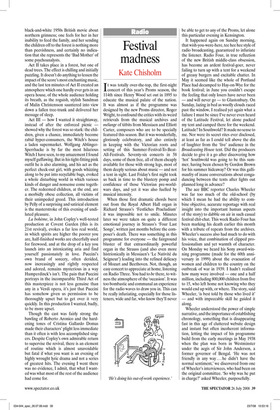Festival madness
Kate Chisholm
It was totally over-the-top, the first-night concert of this year’s Proms season, the 114th since Henry Wood set out in 1895 to educate the musical palate of the nation. It was almost as if the programme was designed by the new Proms director, Roger Wright, to confound the critics with its weird retrievals from the musical archives and mélange of titbits from Messiaen and Elliott Carter, composers who are to be specially featured this season. But it was wonderfully, gloriously celebratory, and also entirely in keeping with the Victorian roots and setting of this Summer-Festival-To-BeatAll-Festivals. Seventy-six concerts in 58 days, some of them free, all of them cheaply available for those with strong legs, most of them deeply serious about music — and not a tent in sight. Last Friday’s first night took us back in time to the blustery pomp and confidence of those Victorian pre-worldwars days, and yet it was also fuelled by musical intensity.
When those first dramatic chords burst out from the Royal Albert Hall organ in Richard Strauss’s ‘Festliches Praeludium’ it was impossible not to smile. Minutes later we were taken on quite a different emotional journey in Strauss’s ‘Four Last Songs’, written just months before the composer’s death. There was something in this programme for everyone — the fairground bluster of that extraordinarily powerful organ in the Strauss (and also even more histrionically in Messiaen’s ‘Le Nativité du Seigneur’) leading into the refined delicacy of Mozart and Beethoven. Not, though, an easy concert to appreciate at home, listening on Radio Three. You had to be there, to witness the atmosphere of the ‘occasion’. It was too bombastic and communal an experience for the radio waves to draw you in. This can be really infuriating, especially for those listeners, wide and far, who know they’ll never be able to get to any of the Proms, let alone this particular evening in Kensington.
It happened again on Sunday morning, that wish-you-were-here, tee hee hee style of radio broadcasting, guaranteed to infuriate the listener. Radio Four, in true reflection of the new British middle-class obsession, has become an ardent festival-goer, never failing to turn up with a tent for a weekend of greasy burgers and excitable chatter. In May it seemed like the whole of Portland Place had decamped to Hay-on-Wye for the book festival; in June you couldn’t escape the feeling that only losers have never been — and will never go — to Glastonbury. On Sunday, lazing in bed as woolly clouds raced past the window, I realised yet again what a failure I must be since I’ve never even heard of the Latitude Festival, let alone packed my tent and camped there for the weekend. Latitude? In Southwold? It made no sense to me. Nor were its secret rites ever disclosed, at least as far as I could tell above the din of laughter from the ‘live’ audience in the Broadcasting House tent. Did the producers decide to give it a go after discovering how ‘hot’ Southwold was going to be this summer, having been chosen by Gordon Brown for his summer hideaway? Or was this gallimaufry of inane conversations about congadancing between the tents after lights out planned long in advance?
The ace BBC reporter Charles Wheeler was far too much of the old-school (by which I mean he had the ability to combine objective, accurate reportage with real insight into the important human aspects of the story) to dabble on air in such casual festival chit-chat. This week Radio Four has been marking his death earlier this month with a tribute of repeats from the archives. Wheeler’s success also had much to do with his voice, that combination of clipped professionalism and yet warmth of character. On Monday we heard his Sony award-winning programme (made for the 60th anniversary in 1999) about the evacuation of women and children to the country on the outbreak of war in 1939. I hadn’t realised how many were involved — one and a half million, including 800,000 children from five to 15, who left home not knowing who they would end up with, or where. The story, said Wheeler, ‘is best told by those who lived it’ — and with impeccable skill he guided it along.
Wheeler understood the power of simple narrative, and the importance of establishing chronology, something that is disappearing fast in this age of cluttered website design and instant but often incoherent information, letting the impact of his programme build from the early meetings in May 1938 when the plan was born in Westminster under the aegis of Sir John Anderson, a former governor of Bengal. ‘He was not friendly in any way ... he didn’t have the normal sentiment,’ we discovered from one of Wheeler’s interviewees, who had been on the original committee. ‘So why was he put in charge?’ asked Wheeler, purposefully.


























































 Previous page
Previous page